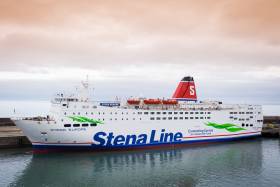Displaying items by tag: Returns to Rosslare
The parent company of Irish Ferries, the Irish Continental Group, has today reported higher profits for 2023, but this was set back as its revenues dipped against background challenges of high inflation coupled with a slowdown in global trade.
According to the Dublin maritime transport group, its pre-tax profits for the year to the end of December had risen to €63.3 million from €62.5 million in 2022.
As for operating profits, they were driven from their ferry division, which saw a rise of 2.5% to €68.4 million from €66.7 million, which reflects a strong performance by Irish Ferries.
The ferry brand operates routes on the Irish Sea (Dublin-Holyhead/Rosslare-Pembroke), a direct service to France (Dublin-Cherbourg), and on the Strait of Dover, linking between the UK’s busiest ferryport and Calais.
Among the operator's fleet, is the chartered in Oscar Wilde which has since made its debut on routes to Wales and France, and has also returned to the Rosslare-Pembroke route from where it entered service last year. As in the above photo caption, Afloat.ie reports on the cruiseferry which is currently on relief duties for ropax Norbay while in dry dock.
Returning to ICG accounts, where revenues achieved for the year, however, eased by 2.2% to €572 million from €584.9 million.
For more RTE News reports on details of ICG’s financial accounts, which also include divisions involving container operations and related terminals based in Dublin and Belfast.
In addition the coverage refers to the Oscar Wilde, as alluded above and which in 2024 the cruiseferry will operate on the Dublin-Holyhead and Dublin-Cherbourg routes.
Stena Europe Returns from Outside Europe With Scheduled Services on Rosslare-Fishguard Route
On completion of an extensive refit programme at an Asian shipyard located in Turkey and at a dock in Liverpool, the UK, the Stena Europe has recently resumed its scheduled sailing services on the Rosslare - Fishguard route.
Afloat.ie adds the veteran ferry returned to service later than expected as an original completion timeframe was set for July before the high-season ended on the St. Georges Channel service linking Ireland and Wales.
As alluded by the operator, Stena Europe's upgrade programme took longer than had been anticipated but as Stena Line’s Trade Director (Irish Sea South) Ian Davies said, the upgraded vessel will now offer a significant improvement in customer care. “I know there has been a certain amount of frustration with the delayed return of the Stena Europe, a very popular vessel with both our freight and travel customers. We had planned for a number of improvements and additions throughout the ship both of a technical and customer-facing nature, but we did encounter a number of challenges which impacted on our works delivery schedule for which I’d like to apologies to our customers. “
Ian Davies added: “During the refit period our cover vessel the Stena Nordica did a sterling job ensuring we maintained our sailing schedule on Fishguard – Rosslare and I would like thank the Captain and crew of the Stena Nordica for their efforts. We are now all looking forward to welcoming the Stena Europe back and I know a lot of our regular customers are looking forward to seeing the improvements.”
“Apart from a number of technical upgrades our freight customers will be particularly pleased to hear that we have altered our deck height to be able to accommodate the increasing trend for high sided trailers and for our travel customers we have also added a new Hygge Lounge which offers luxury reclining seats set in a private, ultra-stylish but cosy surrounding, an upgraded Retail Shop and a refurbished Happy children’s play area to name a few changes.”
As for the whereabouts of Stena Nordica, Afloat.ie yesterday tracked the former Dublin-Holyhead ferry (displaced by Stena Superfast X in 2015) make a repositioning voyage from Rosslare Europort when transitting through the English Channel bound for Rotterdam (Europoort), The Netherlands.
The Japanese built ropax completed the passage having arrived in Europe's largest port today.





























































